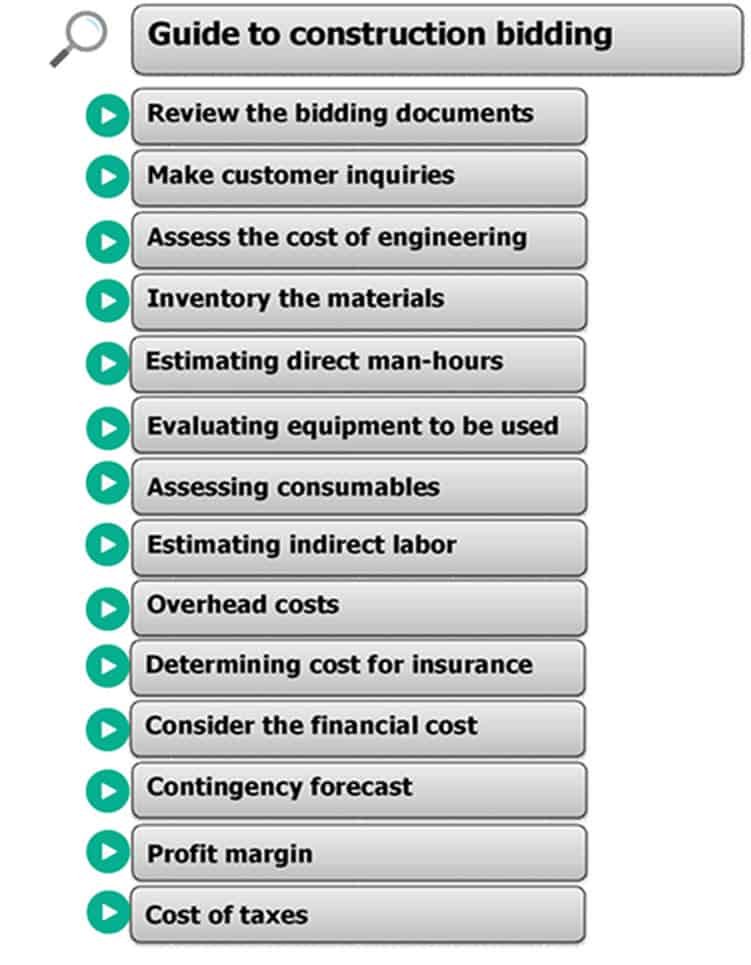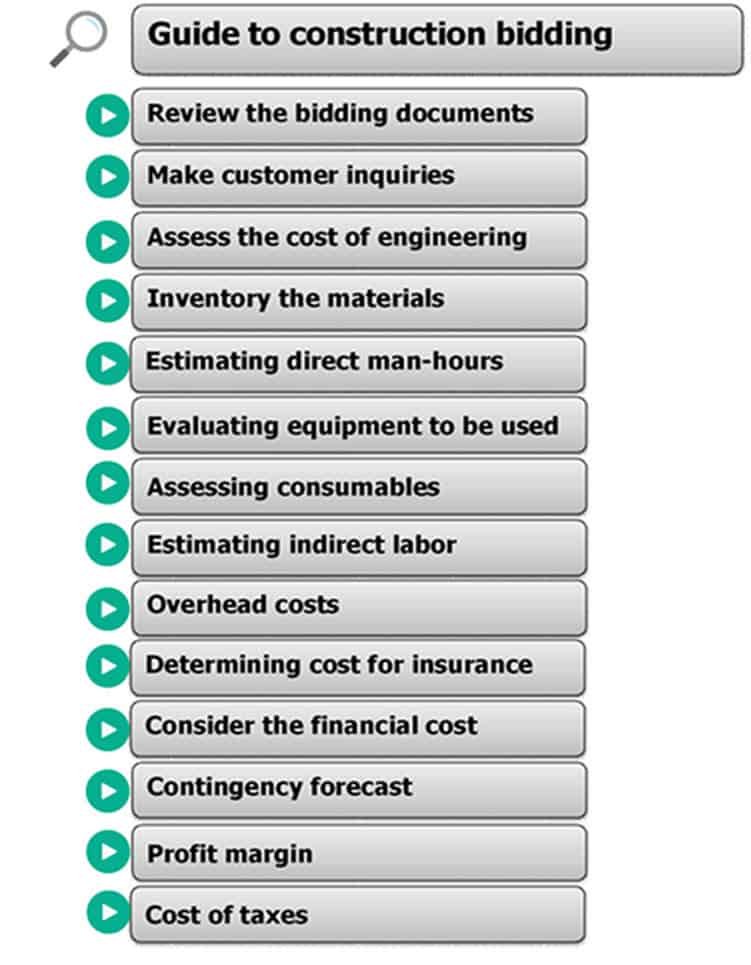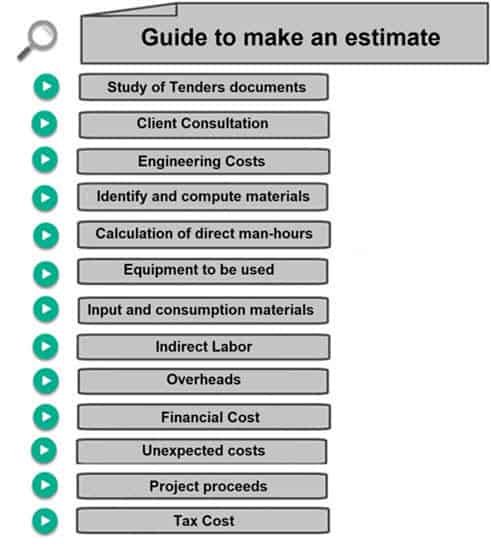 How to prepare a project proposal. In this article, you will review the steps involved in preparing a reliable economic budget for construction.
How to prepare a project proposal. In this article, you will review the steps involved in preparing a reliable economic budget for construction.
How to Set a Reliable Budget for your Offer
The following figure shows the crucial stages to be completed by the estimator in preparing an offer.
In order to prepare a budget, the estimating group must complete the essential stages listed in the table below.

If experience, knowledge, team management, and diligent management of the interested parties are combined with the analysis of each stage, a reliable budget for that project will surely be reached.
Let’s explore each of these factors in more detail:
- Experience:
Experience is invaluable when it comes to quoting industrial facilities. Seasoned professionals have faced various challenges, learned from previous projects, and gained insights into cost estimation, resource allocation, and risk assessment. They can leverage their knowledge of similar projects to make more accurate budgeting decisions. - Knowledge:
A thorough understanding of the industrial installation process, including the intricacies of the specific type of installation to be quoted, is vital. This knowledge helps accurately estimate the costs of labor, materials, equipment, and other resources needed for the project. Knowledge of industry standards, best practices, and regulations also ensures compliance and quality. - Group management:
Industrial installation projects usually involve multiple teams and stakeholders, including engineers, consultants, and technicians from different specialties. Effective group management ensures a reliable budget. - Diligent Management:
It refers to the practice of handling tasks, projects, or responsibilities with careful attention, efficiency, and thoroughness.
Diligent management involves meticulous planning, continuous monitoring, and prompt action to address any issues or challenges that may arise. and is a pillar for the execution of this task.
How to Make a Budget of a Project
The table’s stages are summarized below.
In the upcoming articles of this Blog, we will analyze each stage in greater depth
Make customer inquiries
The buyer opens a channel of communication with the bidders for a period of time to respond to queries raised during the listing period.
The buyer is obliged to send the questions and answers in a circular to all the bidding companies simultaneously.
Customer responses become part of the bidding documents
Asses the cost of Engineering
To accurately assess the cost of engineering in a construction project, it's essential to conduct a detailed cost estimation process, which may involve consulting with experienced engineers, reviewing past project data, and considering industry benchmarks. Each construction project is unique, so the cost assessment should be tailored to the specific requirements and circumstances of the project.
Inventory the Materials
Inventorying materials in construction projects is a crucial process to ensure that the right materials are available at the right time during the construction phase. Proper material inventory management helps to avoid delays, minimize waste, and control project costs
Estimating direct man-hours
Estimating direct man-hours in construction projects is a critical task to determine the labor requirements and overall project schedule. It involves predicting the amount of time it will take for workers to complete specific tasks or activities.
Evaluating equipment to be used
Evaluating equipment to be used in construction projects is a crucial step in ensuring the successful and efficient execution of the project. The right choice of equipment can significantly impact productivity, safety, and cost-effectiveness.
Assessing consumables
Assessing consumables in construction projects is a critical aspect of project planning and management. Consumables are materials and supplies that are used up during the construction process and are not permanently installed or incorporated into the final structure. Proper assessment and management of consumables are essential to avoid delays, control costs, and ensure smooth project execution.
Estimating Indirect Labor
Estimating indirect labor in construction projects is essential for accurate project budgeting and resource planning. Indirect labor refers to the labor force that supports the construction project but is not directly involved in the hands-on construction activities. This includes roles such as project management, supervision, administration, and other support functions
Overhead costs
Overhead costs in construction projects refer to the indirect expenses incurred by a construction company that cannot be directly attributed to a specific project or task but are necessary for the overall operation of the business. These costs are essential for the company to function and complete projects successfully. Overhead costs are typically spread across multiple projects and are not directly billable to any individual project
Determining cost for Insurance
Insurance is crucial in construction to protect against potential risks and liabilities that may arise during the project.
It is essential to strike a balance between adequate coverage and reasonable premiums to protect the project and manage overall project costs effectively.
Consider the financial costs
Financial costs in construction projects refer to the expenses incurred during the construction process, including both direct and indirect costs. Accurate assessment and management of financial costs are crucial for ensuring the project's financial viability and successful completion.
Contingency forecast
Contingency forecasting in construction projects refers to the process of estimating and allocating extra time and resources to account for uncertainties and risks that may arise during the course of the project. These uncertainties can include weather delays, unexpected ground conditions, material availability issues, labor shortages, design changes, and other unforeseen events.
Profit Margin
Profit margin in construction projects refers to the percentage of profit a construction company earns from its projects after deducting all the associated costs. It is a key financial metric used to evaluate the profitability and efficiency of a construction business. Calculating and maintaining a healthy profit margin is crucial for the sustainability and growth of a construction company.
Cost of taxes
The cost of taxes in construction projects can vary significantly depending on the project's location, the type of construction, and the specific tax laws and regulations in that area. Taxes in construction projects can be categorized into several types, and it's essential for construction companies to consider these costs during project planning and budgeting.
In order to prepare a decent economic proposal in any price competition, it is necessary to follow a series of steps that will give us the assurance that we calculated the offer accurately.
In the following publications, we will analyze each of the steps stated in the previous figure.
Recommended reading
Check out the following post on the importance of properly conducting the site visit before quoting.
Budget of a Project – Calculate Man Hours
